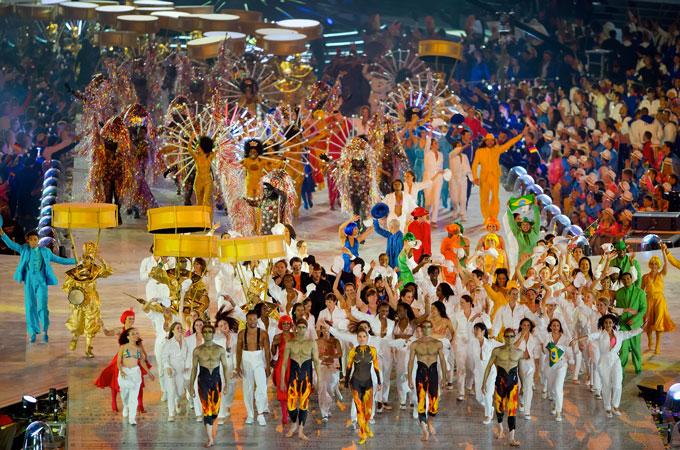2016 Olympics in deep water
David Eulitt/Kansas City Star from Tribune News Service
Performers for the Rio de Janerio 2016 Olympics segment walked across the stage during the Closing Ceremony at Olympic Stadium during the 2012 Summer Olympic Games in London, England, Monday, August 13, 2012.
October 9, 2015
An investigation into Rio de Janeiro waterways found high levels of viruses and bacteria that could endanger athletes and spectators at the 2016 Olympic Games.
In the first independent testing of Olympic sites, The Associated Press concluded not a single venue is fit for swimming or boating. Tests at one location, the Rodrigo de Freitas Lake, measured pollution levels 1.7 million times higher than hazardous levels for the United States.
“If heading to the olympics this year I don’t know if it would even be enjoyable, training for it takes months and what’s it worth if you can just get ill. It doesn’t matter if it’s just the teams incorporated in water events it isn’t fair to those who have put time and effort into practicing.” Jack Griffith, Olympian in training, said.
More than 10,000 athletes from over 200 nations will compete in Rio next year. Of those, 1,400 will come into contact with the contaminated waters.
“What you have there is something you can’t fix easily if you want to host a huge event you have to prepare your nation for it ,if it was my choice i wouldn’t even send my team to go.” Mike Griffith said, a former athlete in the olympics who has competed in water events himself, also father to Jack Griffith.
The pollution comes from raw waste that runs through streams and rivers feeding into the sites where the Olympic Games will take place. Water pollution has always been a concern for Brazil, but these new results show historic levels of contamination.
Reported from National Post ,Ivan Bulaja, the coach of Austria’s sailing team. While training in one of the Olympic sites, Guanabara Bay, Bulaja said some of his sailors have missed training time and stayed in bed for days after falling ill. “This is by far the worst water quality we’ve ever seen in our sailing careers.”
Information received in The Daily Herald reports, “Viruses can enter the body through the mouth, eyes, nose, or a small cut. Sailors and rowers often get splashed with water while racing.” After examining the AP data, Kristina Mena, an American expert in risk assessment.
While bidding for the 2016 Olympic Games, Rio promised to clean up its waterways with $4 billion of sanitation infrastructure. Brazil vowed to build eight treatment facilities to filter out sewage and prevent trash from flowing into waterways. Only one facility completed construction since Rio won the Olympic selection in 2009.
“It’s a problem if you are spending more money on cleaning up waterways but instead another country could easily host and not be spending a huge amount of money.” Mike Griffith said.
He has spent his time reading up on the issue and is trying ways to impact the conclusion and how to get involved.
Locals might be less susceptible to illnesses because it is possible to develop immunities to some of the viruses found in the water. But athletes coming from foreign countries will not have immunity to the sewage-polluted waters.
“The best possible idea would be for athletes to come out early and prepare their bodies for what’s ahead. It might be rough at first but I at least when it’s finally time to compete the athletes will be ready for anything.” Jack Griffith said.
Many other have agreed on this idea and have presented it in the hearings.
With the current rates of pollution, they do not believe there will be enough time to solve the sewage problems before the 2016 game kick off. Rio advised athletes to head out early to prepare themselves for the games so they can build up their immune system. Who knows what will happen to the future generation of athletes in the Olympic Games.









Clare • Oct 16, 2015 at 11:17 am
This really good and informative!! I had no idea this was going on!!